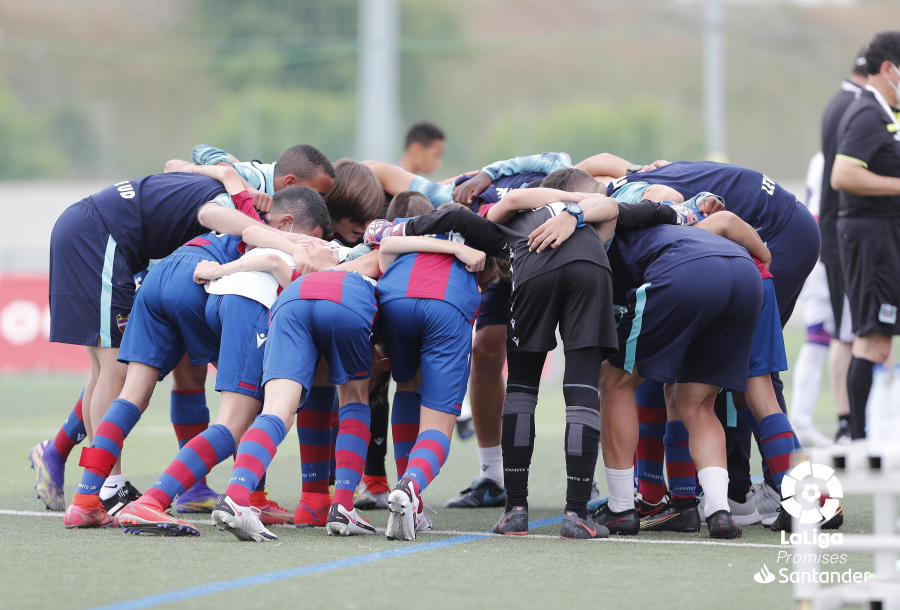
- LaLiga Santander teams use more home-grown footballers than counterparts in Europe’s other major leagues.
- Academy directors at CA Osasuna, Levante UD and RCD Mallorca explained the keys behind the success of Spain’s youth development programmes.
Spain’s football academies have a long-standing reputation for being among the best in the world and new research shows their continued success in generating first-team players.
A recent report from the CIES Football Observatory revealed that home-grown footballers (players who have been trained within LaLiga clubs) accounted for 16.3% of minutes played in LaLiga Santander last season, the highest percentage in any of Europe’s top five leagues. Of the five clubs to provide the most playing time for home-grown players, four of them play in LaLiga: Athletic Club (50.9%), RC Celta (49.0%), Real Sociedad (48.5%) and CA Osasuna (34.3%).
This success with young players has made LaLiga clubs an attractive prospect on the world stage and plays a key part in shaping the brand of Spanish football. Academy directors from CA Osasuna, Levante UD and RCD Mallorca explained why this approach continues to achieve results on and off the pitch.
Sporting and non-sporting education
Asked about the club’s football school at Tajonar, CA Osasuna Academy Director Ángel Alcalde said: “It’s our way of working and our identity. You can’t understand Osasuna without our academy.”
Outlining the principles of the club’s methodology, he continued: “We start bringing players to the club starts from a very early age and we apply a broad system of education throughout their time with us. Not only with the players who come to our club, but with the 140 clubs with which have partnerships.”
“One of our objectives is to try to bring players in early and for them to stay,” continued RCD Mallorca Academy Director Miquel Toni Gelabert. “For this, we place a lot of attention on the non-sporting part of a player’s development. Obviously we work on the sporting side of things, but our concern for the player’s environment and their studies gives us an advantage.”
Elaborating on the importance of ongoing education, Gelabert added: “You need to know the needs that each individual youngster has and know their background, situations and doubts. We’re aware that only a very small percentage will arrive at the top level of sport, so we have a responsibility to care for those who won’t make it to professional football. We have the responsibility to develop people, not just footballers.”
This position is shared by Sergio Gómez, academy director at Levante UD who added: “There’s no doubt that LaLiga’s projects are very much based on developing people, who’ll not only be footballers but also more rounded people. We’re lucky that we’re part of LaLiga as the level of training of the coaches is very high, which means the level of the competition is high.”
Collaboration with LaLiga and other clubs
This level of competition has encouraged LaLiga clubs to develop professional structures to attract and retain the best young players. “The clubs have had very good structures for many years and they are available from very early on,” Gómez added.
At the same time, LaLiga clubs have shown a desire to work together and to share best practices for the benefit of all Spanish football.
Every year, LaLiga holds its Academies Meeting where club directors come together to share tips and ideas to progress their programmes. This led to the creation of the LaLiga Training Hub, a free programme offered to clubs that covers sessions related to youth football, including physical preparation, performance optimisation, scouting and legislation.
“LaLiga Training Hub is one of the many examples of collaborative work and support between clubs,” explained Juan Florit, LaLiga’s head of sporting projects. “We’ve been organising the Academies Meeting for many years so that club directors can meet and exchange knowledge. The whole programme, from the format to the timetable to the subjects taught within the Training Hub, has been built based on feedback and suggestions from the clubs themselves.”
As well as acting as a liaison between clubs, LaLiga also supports Spanish youth football with technology tools. For example, it has offered teams access to its Academies Management software, which helps with the organisation of youth football through a dashboard containing a calendar, squad information, training information, reports, messaging and administration systems.
In addition, LaLiga organises youth football tournaments such as the prestigious LaLiga Promises event. These tournaments provide youngsters with the chance to take part in a competition which receives national and international media coverage, while these tournaments also invite teams from other league to take part. This creates invaluable experiences for the youngsters at the same time as growing LaLiga’s international brand, showing the role that youth development has in Spanish footballing culture.
“The quantity and quality of coaches means youth football is very well regulated, guided and structured,” Gómez concluded. “This level of professionalism is a gift to young players and to Spanish football.”
